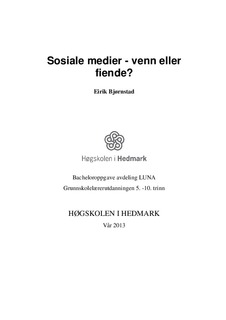| dc.contributor.author | Bjørnstad, Eirik | |
| dc.date.accessioned | 2013-10-08T08:42:30Z | |
| dc.date.available | 2013-10-08T08:42:30Z | |
| dc.date.issued | 2013 | |
| dc.identifier.uri | http://hdl.handle.net/11250/132888 | |
| dc.description | Bacheloroppgave, grunnskolelærerutdanning, 2013 | no_NO |
| dc.description.abstract | Sammendrag: Dagens unge er det man kaller de første digitalt innfødte. Sosiale medier har en sentral plass i hverdagen til et flertall av de unge, og disse nye sosiale mediene har også gjort sitt inntog i skolen. Noen skoler forsøker å bruke de i undervisningen, andre forbyr dem. De unge er tidlig ute med å ta i bruk nye sosiale medier, og man bør etterstrebe å utnytte dette i dagens skole. Samfunnet er i konstant endring, og dagens unge har behov for å lære andre ting enn tidligere. I tillegg har måten å lære på også endret seg. Konnektivismen og det sosiale aspektet ved læring står mye mer sentralt. Ved å utnytte elevenes vaner og bruk rundt sosiale medier, kan man sørge for økt læring. Man må bare vise elevene hvordan. Det sosiale mediet Twitter er særlig godt egnet blant annet fordi det er så enkelt å prøve, det passer ypperlig med tanke på konnektivismen, har spesifikke funksjoner man kan utnytte i læringsøyemed, og det kan inspirere og motivere til økt læring. | no_NO |
| dc.description.abstract | Summary: Today’s adolescents are often referred to as the first digital natives. Social media have a central place in the everyday life of the majority of today’s young people, and these new social media have also made their entry into education. Some schools try to make use of them, while others ban them. The young are quick to make use of new social media, and one should try to exploit this in modern education. In a constantly changing society, the adolescents of today need to gain a different competence than before. Moreover the way we learn has also changed. Connectivism and the social aspect of learning have gained prominence. By taking advantage of the young people’s social media habits, one can ensure increased learning. It is just a matter of showing the pupils how. The social medium Twitter is particularly suitable because it is easy to try out, it fits well with connectivism, has specific features suitable for learning and it can help to inspire and motivate for increased learning. | |
| dc.language.iso | nob | no_NO |
| dc.subject | sosiale medier | no_NO |
| dc.subject | Twitter | no_NO |
| dc.subject | undervisning | no_NO |
| dc.subject | læring | no_NO |
| dc.subject | GLU | no_NO |
| dc.title | Sosiale medier - venn eller fiende? | no_NO |
| dc.title.alternative | Social media - friend or foe? | no_NO |
| dc.type | Bachelor thesis | no_NO |
| dc.subject.nsi | VDP::Social science: 200::Education: 280 | no_NO |
| dc.source.pagenumber | 46 | no_NO |
